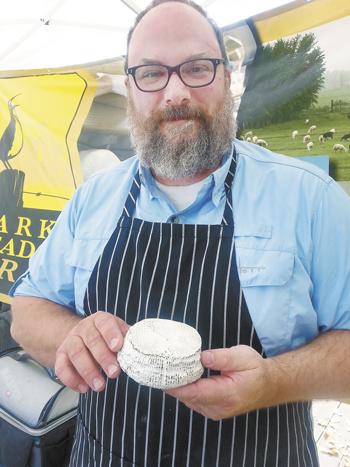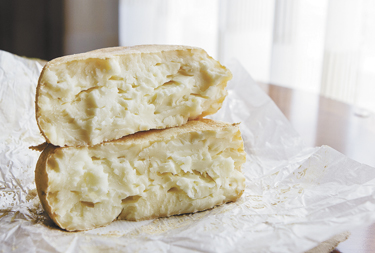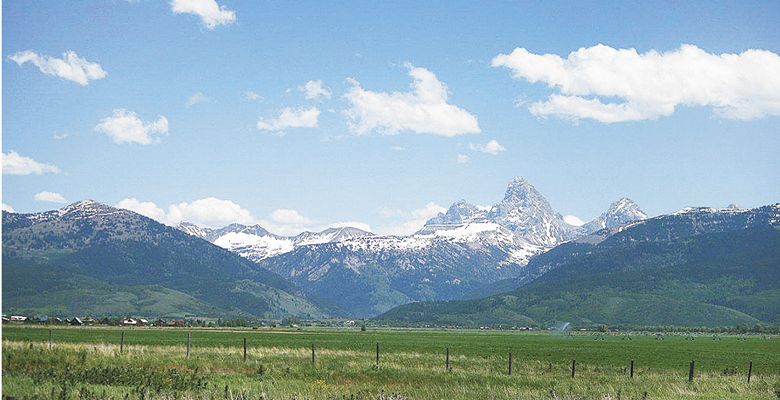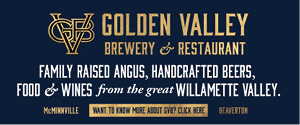Whet Your Thistle
Idaho creamery creates cheeses with weedy rennet
Like many in the cheesemaking world, Kendall Russell did not grow up aspiring to be a cheesemaker. A highly unlikely choice at any career fair, the decision to make cheese professionally is one that typically evolves gradually, usually beginning with a chance cheese encounter. Russell’s experience is no exception.

His initial foray into cheesemaking in the mid-2000s was a joke at first, actually a gag gift given to Russell from friends. The outdated home cheesemaking kit piqued his interest but was not effective at all; that’s when his training as a microbiologist and biochemist counted.
From his home in Richmond, Virginia, he explored bacterial starter cultures, studied milk chemistry and the scientific nuances of making good cheese. As his hobby became increasingly serious, a call from his new father-in-law, a western rancher, opened the possibility of an exciting new adventure.
“He called and asked if I were to start a dairy, what kind of animals would I milk: cows or goats? I said, ‘Sheep.’ In 2008, there weren’t many people making sheep cheese. It seemed like an opportunity and a niche.”
The couple moved to the farm, located in Rexburg, Idaho. Remote, rugged and abundant land, the ranch was perfect for grazing and near the scenic wonderland of Yellowstone and Grand Teton national parks.
Under the name Lark’s Meadow Farms, his first cheeses, Dulcinea, an Alpine-style sheep’s milk cheese, and Helen, a cow’s milk version of the same style, were well received. His knowledge and know-how were evident in the final products, but it was the land that made them distinct, much like fine wine.
“Our farm is at an altitude of 4,865 feet at the confluence of the upper Snake River and Teton River valleys, so we choose to embrace a style of cheese that reflects the terroir,” Russell said.
The Alpine-style cheeses are crafted with milk from their mix of East Friesian, a breed originating from northern Germany, and Lacaune, a variety from southern France; the cow’s milk is purchased from two small, local dairies. The animals graze on fields of alfalfa growing in rich volcanic soil. The pasture contributes subtle flavor complexities, making the cheeses memorable.
“Cheese is an ancient food, so it is hard to be completely original with a food so old,” he said.
Yet the lengthy history and traditions of cheese have not prevented him from stretching his own recipes, including a recent creation inspired by thistle rennet, used in classic Portuguese cheeses. Russell describes his interpretation as an “American original” because making thistle rennet was very much trial and error.

“I had thistles growing all over my property, but there wasn’t much information on making thistle rennet out there,” he said.
Using various amounts and concentrations of thistle, he experimented until he found a favorable flavor profile. His early efforts were not palatable, too bitter and sour. Later, after comparing the traditional Portuguese thistle cheeses he was emulating, he was amazed to discover these bitter and sour notes are hallmarks.
His version, Alto Valle, or high-valley, is a nod to the farm’s location in the upper Snake River Valley. The cheese is as smooth and rich as you’d expect from sheep’s milk cheese, with the subtle funk and savory notes enhanced by the brine washing.
Cloud Veil, an ash-covered variety resembling a goat’s milk Valençay, uses thistle rennet, too, yet the coagulant— for both cheeses — comes from overseas instead of his ranch. In order to be compliant with the requirements of the Food Safety and Modernization Act, each batch of rennet would need to undergo rigorous testing. For now, this step is too much for the limited profit margins in sheep cheese, so he imports thistle rennet from Portugal.
With three more thistle rennet cheeses in development, Russell hopes to be a pioneer in the emerging niche.
“I consider working with thistle rennet to be like a conductor of a symphony,” he explained. “At first, you may have an out of control woodwind section, but once you get them under control, you can do some really interesting things.”
Since the move to Idaho and the launch of the cheese business, Russell and his wife, Rachel, have expanded their family significantly, with four daughters between 2 and 7 years old. A trained baker, Rachel works on the farm, balances the books as well as bakes the bread that accompanies their cheeses at markets in Jackson Hole, Wyoming and Salt Lake City.
Lark’s Meadow cheeses are available at Cheese Bar and other specialty purveyors in Portland. You can also meet the cheesemaker at the 2016 Wedge Festival, Oct. 1, at the Green Dragon in Portland.













